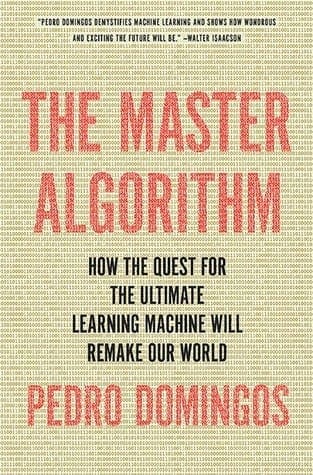 I had the unique opportunity last weekend to spend 30 minutes in conversation with Pedro Domingos, author of “The Master Algorithm: How the Quest for the Ultimate Learning Machine Will Remake Our World.” I was fortunate enough to convince him to come on-air with me on the TechTalk show on WRLR 98.3FM here in Chicago, and am happy to share the podcast of that interview and some additional thoughts. The complete recording is included.
I had the unique opportunity last weekend to spend 30 minutes in conversation with Pedro Domingos, author of “The Master Algorithm: How the Quest for the Ultimate Learning Machine Will Remake Our World.” I was fortunate enough to convince him to come on-air with me on the TechTalk show on WRLR 98.3FM here in Chicago, and am happy to share the podcast of that interview and some additional thoughts. The complete recording is included.
“The Master Algorithm” is a very approachable and enjoyable read, and recommended to anyone who would like to know more about how intelligent machines are changing the world today. There is an enormous potential for these machines and their algorithms to change our future, both for the better and the worse, and helping the lay reader to explore and understand that potential is something the book strives to accomplish. To that end, the reader is not expected to have a background in complex maths or programming (though a basic knowledge of both will help), and working through the concepts and structure Dr. Domingos presents is easily done by anyone interested in the topic.
Early in the book, Dr. Domingos lays the claim that “All knowledge – past, present and future – can be derived from data by a single, universal learning algorithm.” From this simple yet perhaps shocking beginning, it’s possible to derive some things ourselves about where the book and Domingos’ thinking will go. Before speaking to Dr. Domingos, I broke this sentence down to see what assumptions are inherent to it, and get a sense for where it may lead us:
- “All knowledge – past, present, future – can be derived …” is a powerful statement. All knowledge is, by tautological definition, knowable, but stating that it can be “derived” means that we have the ability to attain knowledge through action and intent. This concept is echoed as far back as our classic Greek philosophers such as Socrates, who also believed that we do not need to be taught concepts or lessons a priori (or, in some cases, at all), but that all knowledge is attained through the act of “remembering” or deriving it from our experiences. See Socrates’ discussion with Meno on MIT classics here.
- “… from data … “ is also something that must be discussed and elucidated. What data, where and how is it collected, and by whom? This not only implies a need for comprehensive and accurate data collection, but also great control – since learning entities will base their derivation of knowledge on the data presented to them, accuracy and extent of the data given will undeniably alter the speed, process, and result of their learning processes.
- “… by a single, universal learning algorithm.” One unique machine or learning program that can learn well, learn quickly, and learn everything? This is, of course, the “Master Algorithm” that Dr. Domingos will tell us about!
From this deceptively simple beginning, Dr. Domingos engages the reader with a detailed history and description of the 5 major schools of thought active in machine learning today: the Symbolists, Connectionists, Evolutionaries, Bayesians and Analogizers. Each has a it’s own pros and cons, supporters and detractors, but Domingos believes that all of these philosophies of learning – on their own – ultimately fall short of being able to generate the master algorithm (at least in a useful manner or practical time frame).
If you’re still reading this little taste of what the book is about, I’d highly recommend picking up a copy of “The Master Algorithm” for yourself, or going to Dr. Domingos’ personal website http://pedrodomingos.org . You can listen to our complete conversation here (the interview with Dr. Domingos starts around minute 29):
Original posting and podcast via TechTalk on WRLR 98.3FM

0 Comments